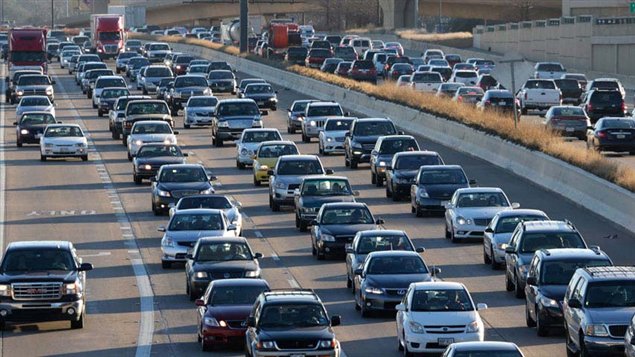If you’ve ever been stuck in a traffic jam, you know how frustrating it can be.
Of course you’re wasting time, and of course fuel, and those are quantifiable costs.
The area around Toronto including suburbs and nearby surrounding cities closely tied economically to the big city, is known as the Greater Toronto Area (GTA). In fact, expansion and development is such that its now merged with the major city of Hamilton to become the GHTA.
Traffic congestion in and around this area can mean literally tens of thousands of lost hours as people sit stuck in their vehicles every day
It’s been estimated that amounts to a loss to the economy in the GHTA of around $6-billion per year.
But a new study from the CD Howe Institute, a public policy think tank, suggests that figure may be too low, and the real costs may be anywhere from $7.5 billion to $11-billion. It’s called, “Cars, congestion, and Costs: A New Approach to Evaluation Government Infrastructure Investment
The author of the study is Benjamin Dachis, a Senior Policy Analyst at the C.D. Howe Institute.
Listen
The current $6 billion oft-cited estimate of the costs includes a $3.3 billion cost from travel delays, increased environmental damage-such as smog, increased vehicle costs from travel delays and increased chance of collision. The rest of the cost estimate is based on the loss of productive time.
The new study suggests that because of traffic congestion, many people are simply dissuaded from venturing out at all and there are substantial economic losses because of that.
Because of the time for commutes, people might be dissuaded from seeking better jobs, which has a negative effect both for an individual and for a potential employer, which in turn affects the economy.
People may also just not bother to attend cultural events for example because of the time and trouble involved in getting there, again with a negative effect on both the event, its viability, and the economy. Congestion dissuades people from coming into the city meaning all sorts of lost business opportunities
There are also intangibles when people meet face to face to discuss things and learn from each other, whether it be a business setting, university, or cultural. If it’s become just too much trouble, those benefits are being lost.
Mr Dachis says that possible solutions involve charging more for travel at peak periods to reduce congestion by encouraging travel at less congested times while also making travel less congested at peak times for those who must travel during peaks.
He notes however that there is limited money available to improve transportation infrastructure and the paper is a discussion point for policy makers to decide where limited funds should go to achieve the best results, whether it be a new highway, instead of a new light rail line, or subway, or vice versa, or in fact, what trade-offs should be made to achieve a particular desired result.
The important thing to note is that the report shows there are billions of dollars in costs associated with congestion, that have not been factored into any of the previous discussions about infrastructure creation and urban development.







For reasons beyond our control, and for an undetermined period of time, our comment section is now closed. However, our social networks remain open to your contributions.